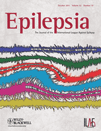Investigating epilepsy in Africa: 10 years of data collection using a standardized questionnaire in 2,269 peoples with epilepsy
Summary
Purpose: The need for comparable epidemiologic data on epilepsy from various locations in tropical areas has led in 1994 to the creation of a questionnaire able to standardize information. The Limoges’ questionnaire was created to collect information independently of the objectives of each survey performed, and since it has been employed in various continents under tropics latitude. In Africa between 1994 and 2004, 13 epidemiologic surveys in 12 countries were performed by this means. Authors of these works were solicited to communicate their raw data on people with epilepsy (PWE).
Methods: Information collected was aggregated in a database upon which operations of data management were processed. Undernutrition status was determined using an anthropologic method, according World Health Organization (WHO) recommendations. Factors associated with undernutrition and absence of treatment by phenobarbitone were searched for by using multivariate logistic regression.
Key Findings: Information about 2,269 PWE was collected. Mean treatment gap and undernutrition were determined, respectively, to be 30.6% [95% confidence interval (95% CI) 28.7–32.6] and 25.4% (95% CI 22.7–28.2). Factors significantly associated with undernutrition and not being treated with phenobarbitone were determined.
Significance: Despite the different purposes of each study, we were able to pool information in order to characterize and study particular traits of PWE in Africa. Some items of particular importance should be collected systematically and will be highlighted in a newer version of this questionnaire. Because many surveys were undertaken using this tool in tropical areas, a backward compatibility should be ensured.




